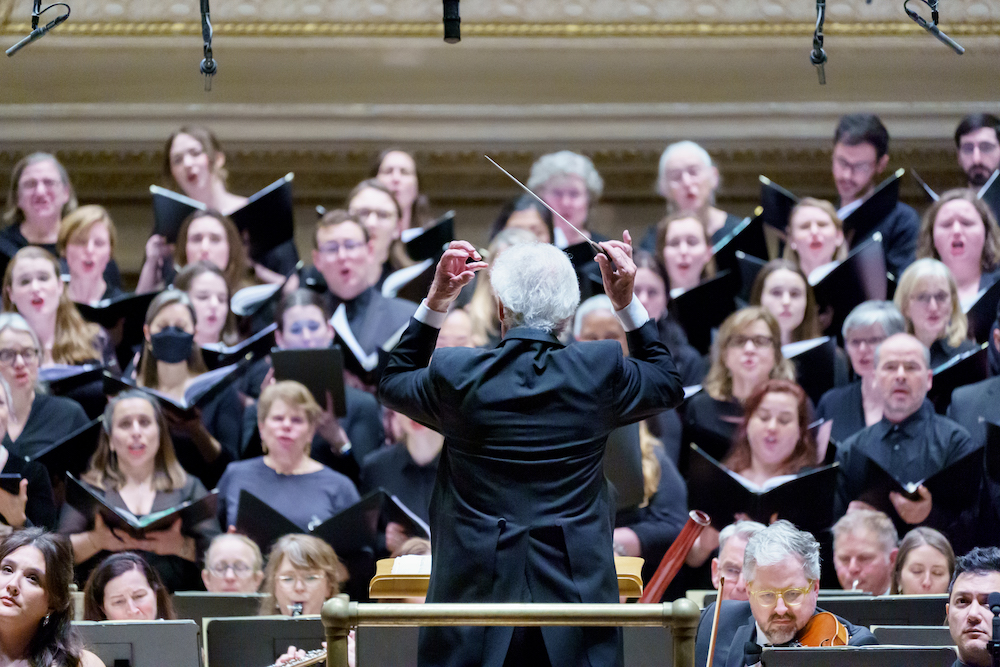Beethoven’s Ninth gets a brisk star turn from Zander, Boston Philharmonic

No Communist wall came down. No new concert hall opened. It wasn’t even the hopeful start or the weary end of a concert season. It was just a Sunday afternoon in February in Carnegie Hall.
But they played Beethoven’s Ninth Symphony anyway.
Spared the task of celebrating something else, Sunday’s performance of this uniquely complex and challenging piece, by the Boston Philharmonic under its founder and music director Benjamin Zander, was all about the music.
The enterprising and loquacious English conductor, who will turn 84 in about a week, has been burrowing into this score and Beethoven’s biography for at least four decades, ever since he and his orchestra made their Carnegie Hall debut with it in 1983.
The most talked-about fruit of his research has been the case he made for observing the metronome markings that Beethoven put in the score to indicate his preferred tempos. Generations of conductors have dismissed these as impossibly fast and a regrettable error by the aging composer.
But citing the fleet performances of today’s period-instrument orchestras (which proliferate around Boston like Red Sox fan clubs), Zander resolved not just to make those tempos work, but to show what they reveal about Beethoven’s message to humankind in this philosophical symphony.
The product of this effort, recorded in 2017 with Zander conducting the Philharmonia Orchestra of London, clocked in at 58 minutes and 37 seconds, instead of the more typical hour and a quarter—the musical performance equivalent of Roger Bannister cracking the four-minute mile.
In contrast, the accompanying audio lecture by Zander ran for 2 hours, 39 minutes, and 57 seconds. Short or long, both the 2017 recording and the extended remarks proved engaging and enlightening. In more recent interviews, the conductor has de-emphasized the experimental (not to say stunt) aspect of his ultra-rapid Ninth, preferring to say he has “internalized” Beethoven’s indicated tempos and now feels free to, in effect, go with the flow.
Sunday’s performance at Carnegie put this new perspective to the test. Still present were the features that startled listeners who were accustomed to broader, more Romantic interpretations: the second movement’s trio chipmunk-chattering on fast forward, the uptempo Adagio, the hard-driving march in the finale. But Zander also gave some tempo relief to his mixed ensemble of professionals, amateurs and students — “embracing all of humanity,” as he said, echoing Ode to Joy poet Friedrich Schiller in a pre-performance talk (one of two) on Sunday. He brought in the symphony six minutes longer than the recording, though still a brisk hour and five overall.
Whether that helped or hurt the performance was hard to tell. Sometimes a dose of tempo urgency pulls a group together. Sunday’s performance, enthusiastic as it was, lacked the crisp ensemble needed to project the first movement’s whiplash changes of mood, and the closing funeral march sounded about as dire as a child foot-dragging to school.
Urgency was not lacking in the scherzo-like Molto vivace, racing along at Beethoven’s indicated whirlwind tempo. Strings sounded clearer than woodwinds in the many pages of teasing pianissimo, but the explosive fortissimos satisfied completely. Every player except the horn seemed to keep up with the blistering tempo of the trio, but it was still hard to believe that this helter-skelter was what Beethoven was after.
A favorite punch line in a Zander anecdote goes something like: A famous musician hears him bring out a certain instrumental line in a familiar symphony and exclaims, “I never heard that before!” Performing the Ninth’s third movement on Sunday, strings whispered, woodwinds glowed, and the music flowed ahead at the indicated “cantabile” (singing) tempo — all good. But when the violins took over with florid curlicues in sixteenth notes, the conductor decided (as he said in his lecture) that the real tune was in the accompanying wind parts, and so he emphasized those, pushing the violins to the background. In performance, the choice seemed more perverse than perceptive. Overall, however, the forward-moving tempo lifted the music, at no loss of profundity.
Zander became so enamored of the bassoonists’ countermelody to the “Ode to Joy” theme in the violas that he had them play it by themselves for the audience before he started the symphony, then masked the violas with it in the performance. One had, indeed, never heard that before — nor wished to hear it again.
But such quibbles were soon forgotten in an inspiring traversal of the choral finale, to which all the performing elements made memorable contributions — starting with Zander, who set brisk, joyous tempos that marshaled the players and spared the singers’ lung capacity. The conductor deftly managed the shifting storm and set off some thrilling crescendos.
The combined forces of Chorus Pro Musica and Boston University’s Marsh Chapel Choir, prepared by Jamie Kirsch and Scott Allen Jarrett respectively, rose to all the score’s demands, from perilously high, soft soprano entrances to the men’s sturdy, clear fortissimo on “Seid umschlungen, Millionen!”
The performance was blessed with an especially fine quartet of soloists, who resisted all temptations to oversing. Baritone Alfred Walker’s opening recitative launched the festivities with authority and crystalline diction. Tenor Nicholas Phan sounded more jaunty than militant in the march variation, in accordance with the overall mood. Mezzo-soprano Ashley Dixon held her own splendidly in the ensembles, thanks in part to Liv Redpath’s modulation of her bell-like soprano, with its floating high notes. The wings of joy did indeed “gently wave” over the quartet’s melodious final cadenza.
Keeping the Prestissimo coda under firm control to the last note, Zander brought the symphony to an ecstatic, not hectic, conclusion. In the end, one felt only gratitude for this opportunity to hear the Ninth for the Ninth’s sake.





